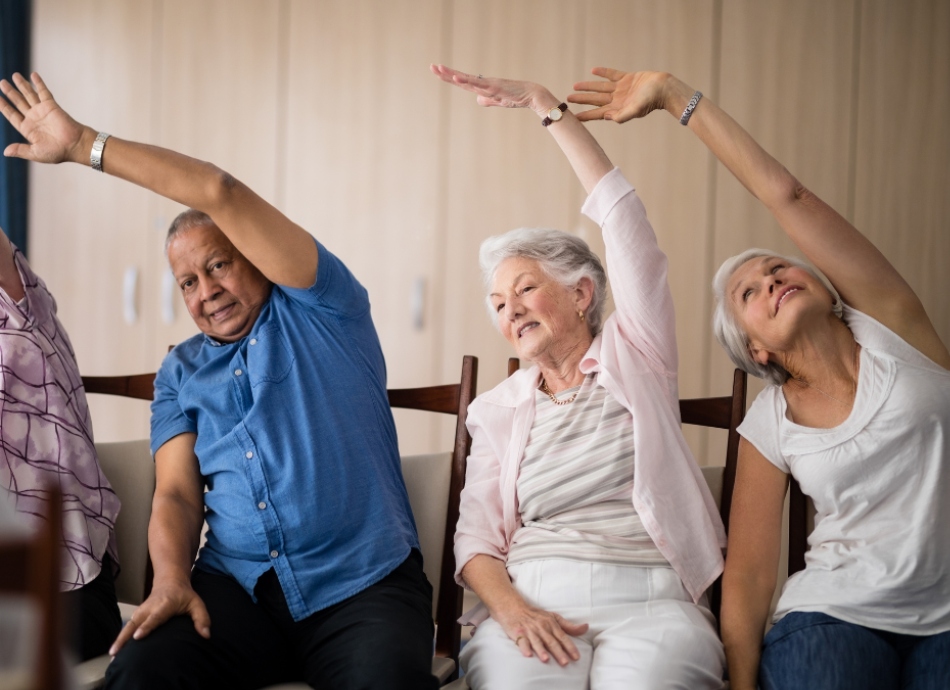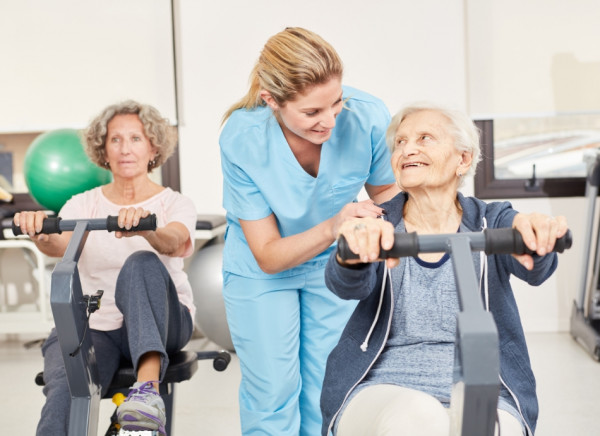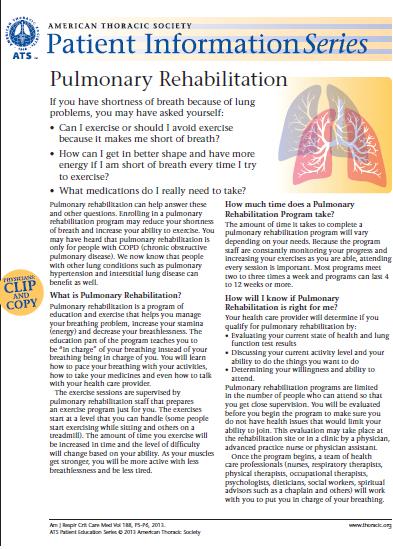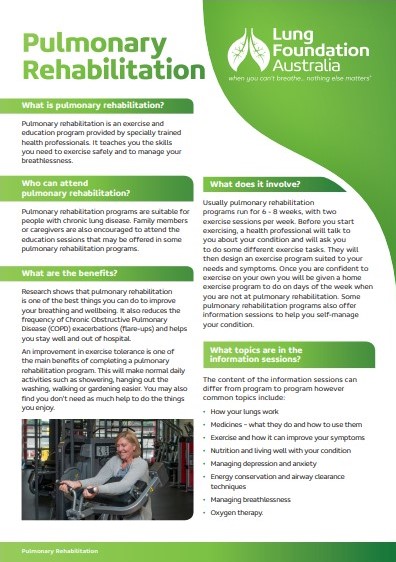Pulmonary rehabilitation
Also known as PR or pulmonary rehab
Key points about pulmonary rehabilitation
- Pulmonary rehabilitation is an education and exercise programme for people with chronic breathing problems such as COPD to manage their breathing and improve their general condition.
- It's effective for improving your quality of life and ability to exercise, and reduces hospital admissions.
- It should be used for other chronic respiratory conditions such as sarcoidosis, bronchiectasis, pulmonary fibrosis and cystic fibrosis, or if you've had lung surgery.
- Pulmonary rehabilitation focuses on education and exercise and teaches you how to exercise and clear your airways during the programme and how to continue afterwards.

Programmes focus on education and exercise. They're usually arranged by specialist nurses and physiotherapists. They usually last 6 to 12 weeks and include 2 to 3 sessions per week in a gymnasium or local hall. For individuals living rurally or remotely, there may be on-line programmes and support from their regional hospital or PHO (Primary Health Organisation). The 2 main components of a pulmonary rehabilitation programme are exercise, and education about specific lung conditions and safe and effective ways of breathing and exercising.
Exercise
- An individual exercise programme is designed for you and takes your health into account.
- The programme is gentle at first but should increase as your fitness improves.
- You should be given home exercises so that when the programme ends you will know how to stay well and fit at home.
- Exercise and daily measures to clear your airways should continue during and after the programme. Do at least 20 to 30 minutes of exercise most days – preferably every day. More is better. “Huffing and puffing” or feeling breathless won't cause harm, but should be under your control at all times.

Image credit: Canva
The physiotherapist or respiratory nurse can discuss other activity options such as Sing your lungs out(external link), a community-based singing group for people with lung disease. Read more about singing for lung health(external link).
Education
The education session covers information and tips on topics such as:
- your lung disease or condition and how to manage it
- how to eat a healthy and balanced diet
- energy-conserving techniques
- breathing strategies
- psychological counselling and/or group support.
This 2-part series aims to encourage people with chronic obstructive pulmonary disease (COPD) and other lung problems to participate in a pulmonary rehabilitation programme. Doing exercise is an effective way of reducing your symptoms and improving your overall health.
Video: Understanding pulmonary rehabilitation part 1
(King's College Hospital, UK, 2007)
Video: Understanding pulmonary rehabilitation part 2
(Kings College Hospital, UK, 2007)
Attending a programme won't cure your lung disease or completely ease your breathing problems, but it can help you function better in your daily life. Pulmonary rehabilitation improves the quality of life and reduces hospital admissions of people with COPD and other long-term lung conditions..
Taking part in pulmonary rehabilitation should improve your fitness and muscle strength. This makes you feel more confident to do things. It helps you use the oxygen you breathe more efficiently and helps you cope better with feeling out of breath. It can also help you feel better mentally.
Anybody, including those who smoke or vape, can benefit from attending pulmonary rehabilitation, as the programme focuses on improving quality of life.
Ask your healthcare provider about a pulmonary rehabilitation programme in your area. There are a range of programmes around the country, including some offered by local Health New Zealand | Te Whatu Ora local or regional hospitals, or branches of the Asthma & Respiratory Foundation(external link). Some are designed for Māori or Pacific Peoples.
You can search for a pulmonary rehabilitation service(external link) in your area (put your address into the Healthpoint search box).
Jeannie's story
Jeannie Sullivan started smoking when she was 21. She started with a packet lasting a fortnight and slowly moved onto a packet a day by her late 30s. Jeannie is proud to say she finally stopped smoking about 10 years ago.
Unfortunately, the damage had been done. Jeannie thought she had asthma so went to her GP and was told she had emphysema or COPD.
Jeannie says one of the best things that ever happened to her was going to pulmonary rehabilitation. She looked forward to the twice a week classes and socialising, getting fit and learning about how to manage COPD. Read about how it changed her life: One of the best things that ever happened to me – going to rehab!(external link)
Video: Pulmonary rehabilitation for chronic lung conditions
This video is about pulmonary rehabilitation. The first part of the video (up to 8 minutes) has simple exercises that you can do at home. Then there's information about changes you can make to improve your symptoms, such as exercising, quitting smoking, breathing techniques, etc.
(NHS Forth Valley, UK, 2017)
Video: Pulmonary rehabilitation exercises at home
(NHS Greater Glasgow and Clyde, UK, 2020)
Video: Exercise for COPD – improve your strength and mobility
(NHS Greater Glasgow and Clyde, UK, 2021)
The following links have more information about pulmonary rehabilitation. Be aware that websites from other countries may have information that differs from New Zealand recommendations.
Pulmonary rehabilitation(external link) NIH – National Heart, Lung, and Blood Institute, US
Pulmonary rehabilitation(external link) Australian Lung Foundation
Brochures
Pulmonary rehabilitation – factsheet(external link) Lung Foundation Australia
Pulmonary rehabilitation – patient information(external link) American Thoracic Society
Apps
Breathing apps
Self-management and healthy living apps
References
- Pulmonary rehabilitation for people with COPD(external link) BPAC, NZ, 2017
- Hancox RJ, Jones S, Baggott C, et al. on behalf of the Asthma and Respiratory Foundation New Zealand COPD 2021 Guidelines – a quick reference guide(external link)
-
Chronic obstructive pulmonary disease (COPD) | He mate puru ia auraki (Frailty care guides 2023)(external link) Health Quality and Safety Commission, NZ, 2023
See our page Pulmonary rehabilitation for healthcare providers
Brochures

American Thoracic Society, 2013

Lung Foundation Australia, 2018
Credits: Healthify editorial team. Healthify is brought to you by Health Navigator Charitable Trust.
Reviewed by: Dr Roland Meyer, Specialist Physician, Respiratory and General Medicine
Last reviewed:





